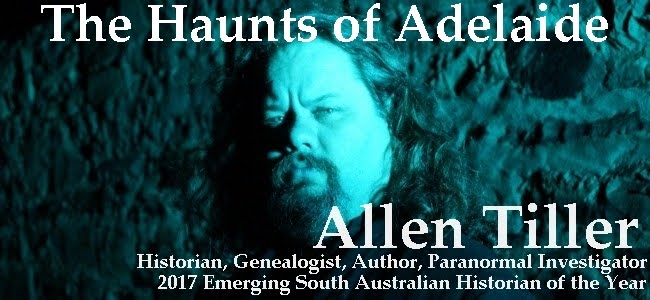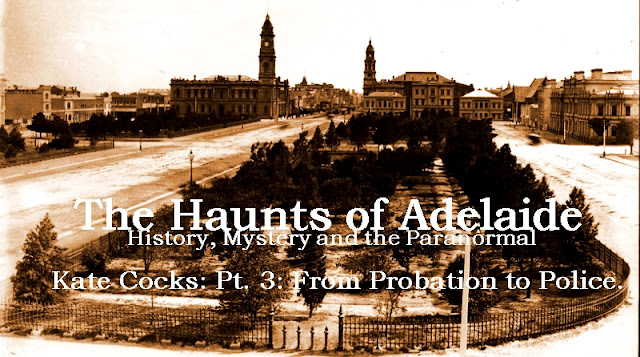Kate Cocks: Pt IV: The Crusade Against Psychic Exploitation.
1917, the Great
War was devouring people and resources. South Australian women were scared for
their sons, brothers and husbands fighting for the war effort. Women were doing
anything they could to try and find out how their loved ones were doing on
the war front, and whether they were alive, wounded, or dead.
Women were turning to psychics in droves in the hope
of divining some knowledge about their loved ones, and unfortunately a lot of “rogue”
psychics began to spring up around the State, ready to look deep into their
crystal balls, and part distraught women from their money, with fanciful tales
divined for dollars.
So bad was the trend, that one fortune-teller told an anxious mother, worried about her son, that he would be hung if she, the fortune-teller, did not intervene. To stop it happening, the mother would have to pay money to the psychic to prevent the tragedy!
So bad was the trend, that one fortune-teller told an anxious mother, worried about her son, that he would be hung if she, the fortune-teller, did not intervene. To stop it happening, the mother would have to pay money to the psychic to prevent the tragedy!
Disgusted by this turn of events, Kate Cocks and her
Women’s Police Department went on a crusade to stop the onslaught of “Occult
Houses” that had started opening around Adelaide. Cocks had the law behind her, as The Police Act of 1916, Section 67, clearly laid out the law against Fortune
Tellers (you can learn more about the laws at a previous post here: http://hauntedadelaide.blogspot.com/2017/10/trading-in-sorrow-criminal-clairvoyants.html
)
Cocks said of the trend:
“Current events largely determine the exploitation of simple-hearted people by callous adventurers.' observed Miss Cocks. 'As an example, I quote the flood of fortune-telling that swept over the country in wartime. 'It was a cruel thing, apart from its ridiculous aspect. Women opened 'occult' apartments. and undertook to read the future for varying amounts of payment, according to the financial position of their clients. These were mostly women of the nervy type who were living at high pressure on account of having loved ones at the war. 'It was a frightful thing to exploit such anxiety, and we did not pause in our ruthless cleaning of those crystal-gazers until they were no more.” (The Advertiser, October 1936)
“Current events largely determine the exploitation of simple-hearted people by callous adventurers.' observed Miss Cocks. 'As an example, I quote the flood of fortune-telling that swept over the country in wartime. 'It was a cruel thing, apart from its ridiculous aspect. Women opened 'occult' apartments. and undertook to read the future for varying amounts of payment, according to the financial position of their clients. These were mostly women of the nervy type who were living at high pressure on account of having loved ones at the war. 'It was a frightful thing to exploit such anxiety, and we did not pause in our ruthless cleaning of those crystal-gazers until they were no more.” (The Advertiser, October 1936)
Cocks crusade
against psychics really took off in 1917, when she was involved in a number of
stings bringing down fake psychics around Adelaide. The 25th case in the succession of cases against fraudulent psychics was a young Adelaide man who
had put an advertisement in the local newspapers, asking for anyone wanting
fortunes told, to send him penny stamps through the mail to a Sydney address.
The scammer had set up his rouse at the Adelaide Post Office so that any mail addressed to “Hubert, Box 440” in Sydney, leaving from Adelaide, be held for a few days so he could pick it up.
On receiving a letter, he replied asking for money for more psychic insights. What he wasn’t counting on was the ingenuity of Cocks, who caught the rogue psychic out. He ended up with 3 months gaol, and 25 pound fine for his efforts and was recorded as a “rogue or vagabond” in his court records.
The scammer had set up his rouse at the Adelaide Post Office so that any mail addressed to “Hubert, Box 440” in Sydney, leaving from Adelaide, be held for a few days so he could pick it up.
On receiving a letter, he replied asking for money for more psychic insights. What he wasn’t counting on was the ingenuity of Cocks, who caught the rogue psychic out. He ended up with 3 months gaol, and 25 pound fine for his efforts and was recorded as a “rogue or vagabond” in his court records.
A little over a decade later, in 1929, Cocks was
still pursuing psychics under Section 67. At the Royal Adelaide Show, she had
set up a sting and had her fortune read by a number of palm readers, and
crystal ball psychics.
5 psychics were arrested and charged under Section 67, being; Frances Alexander, George Mereno, Mary Stanley, Julia Stanley and Alick Alexander. All pleaded guilty but in ignorance of the law. Each psychic was fined 10 Shillings for their crime and 10 shillings court costs. ($77 AUD total costs each in today’s money).
5 psychics were arrested and charged under Section 67, being; Frances Alexander, George Mereno, Mary Stanley, Julia Stanley and Alick Alexander. All pleaded guilty but in ignorance of the law. Each psychic was fined 10 Shillings for their crime and 10 shillings court costs. ($77 AUD total costs each in today’s money).
Today the Police Act 1916, Section 67 is no longer
used, instead, we have a newer law meant to stop fake psychics. The law is now
known as The South Australian Police Act, Section 40 Part 8, and is enforceable
(even though I am not aware of anyone who has been arrested under the act, even
though I am aware of several fraudulent psychics!)
Section 40 Part 8 of the South Australian Police Act
(https://www.legislation.sa.gov.au/LZ/C/A/SUMMARY%20OFFENCES%20ACT%201953/CURRENT/1953.55.UN.PDF)
40—Acting as a spiritualist, medium etc with intent to
defraud A person who, with intent to defraud, purports to act as a spiritualist
or medium, or to exercise powers of telepathy or clairvoyance or other similar
powers is guilty of an offence.
Maximum penalty: $10 000 or imprisonment for 2 years.
You can also report fake psychics to scam watch!
https://www.scamwatch.gov.au/types-of-scams/buying-or-selling/psychic-clairvoyant
You can also report fake psychics to scam watch!
https://www.scamwatch.gov.au/types-of-scams/buying-or-selling/psychic-clairvoyant
NEXT WEEK: Kate
Cocks: Pt V(a): The Stolen Generation
Researched and written by Allen Tiller © 2018
Bibliography on the final post




